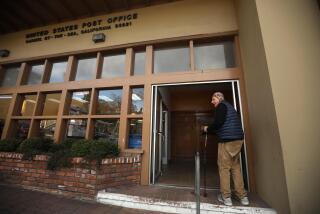On the wrong side of the 310 tracks
AT LAST, someone has stepped in to end the foaming-at-the-mouth insanity of Southern Californiaâs real estate boom. Fed chief Ben Bernanke and his Amazing Jumping Interest Rates (watch them leap!) couldnât do it. The âAmericaâs Most Overvalued Real Estateâ blog couldnât do it (as of Wednesday, it had disappeared entirely). But make way for the state Public Utilities Commission, an organization whose name practically guarantees a bad time. Its scheme to make sure no one moves for the next five years? A new area code for West L.A. -- a code so undesirable it will turn a 310 number into a bragging right.
Theyâre sneaky, these commissioners. They know how Angelenos think. This is a town more concerned than most with status. Higher interest rates simply make homes more expensive, and therefore more desirable. Conventional economic thinking doesnât work here. But what if trading up to a bigger, more generously screening-roomed house involved some of kind of status penalty -- negative egomortization, if you will? What if -- hear me out -- they forced you to take, say, an 818 area code with that new mansion in Beverly Hills?
Yes, I know what youâre thinking: instant crash. Brokers on the streets, begging for iced lattes. Makers of branded âOpen Houseâ signage filing for Chapter 11. And conversations echoing through the Hollywood Hills: âBut honey, we canât flip the house now ... people will think weâve moved to the Valley!â And yet this is exactly what those bad-boy commissioners are going to do come Aug. 26 -- only much, much worse.
Using the ingenious cover of a telephone number shortage (there are âonlyâ 1.9 million 310 numbers still unused, so clearly this is an emergency situation), they have come up with an entirely new code, one so traumatically unfamiliar you might as well live in Blue Springs, Mo. If youâre covered by the three digits in question -- 424 -- youâll even have to dial 1 and the area code before every phone number you call, adding to the illusion that youâre stuck on a potato farm in Idaho.
In one sense, of course, area code snobbery makes no sense. In almost every other field of communications technology, the newer the better. But big-city digits are like brands -- residents want to be associated with them because it gives them insider status. And there is no hipper code than 310. The only consolation for those cursed with a 424 code is that everyone in the 310 area will also have to dial 1 and the area code to place calls: even 310ers calling other 310ers.
The downside, however, is this: Angelenos with caller ID will not only refuse to take your calls, they will secretly blame you for their having to spend the entire Labor Day weekend adding an area code to each of the 8,231 numbers in their cellphoneâs memory. PDA owners will have to do this twice, meaning they probably wonât be done until Christmas, when they wonât be sending you any gifts.
I should point out that it is technically possible to keep your 310 number when you move -- in the same way that it is technically possible to copy your SIM card onto your hard drive, upload it online, then beam it to your toaster via Bluetooth. The truth is that when you buy another house, you will more than likely end up on the wrong side of Southern Californiaâs telephonic Berlin Wall.
As for those outsiders moving into the city for the first time ... they donât stand a chance. Being fobbed off with a 424 number will become a kind of Angeleno rite of passage, like paying $150 for a cab from LAX to Culver City. I suffered a similar fate when I moved from London to Manhattan in late 2000. I was stuck with a 646 code, which meant I might as well have saved on the West Village rent and settled in New Jersey. Unlike Los Angeles, New York had no collective guilt about this because the 212 owners could still dial each other with seven digits. But in two years, I donât think I got a single incoming call, except from telemarketers, who thought I was in Oklahoma. It just felt so wrong. A brand-name telephone number should be part of the consolation for the parking restrictions and unaffordable housing that come with big-city living.
And yet, with L.A. housing becoming even more unaffordable (in spite of slowing demand), we should applaud the genius of the PUC. Weâll soon get used to dialing 11 digits, after all. Weâll soon forget about the time we wasted updating our cellphones and PDAs. But weâll always remember that magical day in August when Southern Californiaâs housing market finally cooled. Yes, those commissioners are clever folks indeed.
Perhaps they can fix the deficit next.
More to Read
Inside the business of entertainment
The Wide Shot brings you news, analysis and insights on everything from streaming wars to production â and what it all means for the future.
You may occasionally receive promotional content from the Los Angeles Times.










